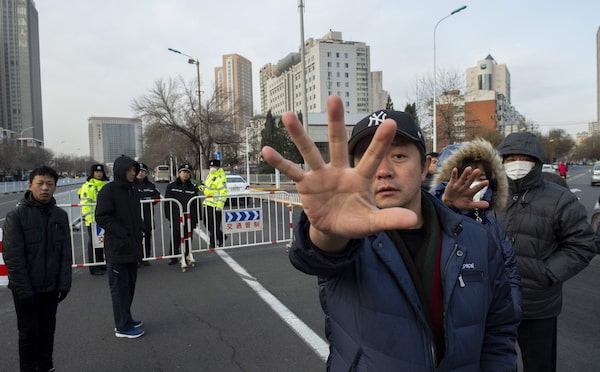
Plainclothes police officers gesture to signify photographs should not be taken in front of the number 2 Intermediate People's Court in Tianjin on Dec. 26, 2018.NICOLAS ASFOURI/AFP/Getty Images
Within minutes of arriving outside a bank in Chengdu, capital of China’s Sichuan province, Dutch journalist Sjoerd den Daas was surrounded.
Mr. den Daas, a Beijing-based correspondent for broadcaster NOS, was there with a cameraman to cover a protest by customers of Sichuan Trust, which collapsed in early 2024, taking many people’s deposits with it.
In an altercation caught on camera, security guards and plainclothes police manhandled Mr. den Daas as he tried to interview protesters, eventually shoving him to the ground. His cameraman too, was accosted, and both were bundled into a police car and held for several hours. After their release, they were tailed by multiple vehicles until they left Chengdu, Mr. den Daas said.
Their experience is increasingly common for foreign reporters covering China today. According to a new report from the Foreign Correspondents’ Club of China, while last year marked a welcome return to travel after tough COVID pandemic restrictions were lifted, that meant more reporters experienced harassment and surveillance in the field.
“During the pandemic, the situation in the field was ghastly,” said David Rennie, Beijing bureau chief for The Economist. “Now the situation is much more random. It is harder to predict when you’ll be followed or when unsupervised reporting trips will be cut short by the local propaganda department.”
Founded in 1981, the FCCC has more than 150 members from all over the world. It has never been officially recognized by Beijing, which has referred to it as an “illegal organization” and has in recent years pressed journalists new to China not to join or run for board seats.
Reporting in China has always been difficult. It was not until 2007, in the run-up to the first Beijing Olympics, that reporters were permitted to leave the capital without permission, and interview anyone who would speak to them.
This didn’t mean reporters were always welcome, especially in parts of the country deemed sensitive, such as ethnic minority regions or along China’s various borders. The Globe and Mail’s Nathan VanderKlippe was detained in Xinjiang in 2017 and had his laptop seized. Visiting Inner Mongolia in 2020, Los Angeles Times correspondent Alice Su was assaulted by police and held for four hours.
According to the FCCC, this type of treatment is becoming more common across the country, with four out of five survey respondents saying “they had experienced interference, harassment or violence” while in the field.
“Reporting trips during which foreign journalists do not experience problems are the exception,” the report said, noting that more than a third of respondents said they had been forced to cancel trips or interviews after the authorities intervened to press subjects to withdraw consent or otherwise pull out.
China’s sprawling surveillance state makes it hard for journalists to travel incognito: By law, hotels must register foreign guests with the police, and pervasive facial recognition technology means it is easy to track people through airports and train stations. Many respondents said it was not uncommon for police to be waiting for them or turn up shortly after they arrived somewhere.
In two separate incidents, journalists told the FCCC they had been followed by drones as they tried to conduct interviews.
More than 99 per cent of respondents to the FCCC survey said conditions in China today “rarely or never met international reporting standards.”
For many journalists, even entering the country can be impossible. The Globe is one of multiple publications – from a variety of countries, including Australia, India and Britain – that has been without a correspondent in mainland China for several years after the authorities refused to issue a visa.
Almost a third of respondents told the FCCC their bureau was understaffed because of difficulties securing visas for new reporters. Last year, only one U.S. outlet was successful in obtaining accreditation; all others said they had been unable to bring in replacements for departing correspondents, let alone increase the number of journalists they have working in China.
The Globe covers China from Hong Kong, long a refuge of sorts for journalists who have been ejected from or unable to enter the mainland.
But this too is changing. Work visas for Hong Kong have become harder to obtain – with at least one U.S. outlet being rejected this year – and last month, the city enacted a draconian new national security law known as Article 23 which press freedom groups have warned could seriously affect reporting there.
Radio Free Asia, a U.S. government-funded broadcaster, pulled out staff ahead of the law coming into force, and on Friday said it had shut its Hong Kong bureau.
“Actions by Hong Kong authorities, including referring to RFA as a ‘foreign force,’ raise serious questions about our ability to operate in safety with the enactment of Article 23,” said RFA president Bay Fang, adding the organization will continue to cover Hong Kong from outside.
Hong Kong has plummeted in Reporters Without Borders’ annual ranking of global press freedom, falling from number 70 in 2018 to 140th of 180 countries last year. At 179, China ranks even lower, ahead of only North Korea, and remains the world’s largest jailer of journalists, with at least 109 imprisoned today.
James Griffiths is a member of the Foreign Correspondents’ Club of China.
 James Griffiths
James Griffiths